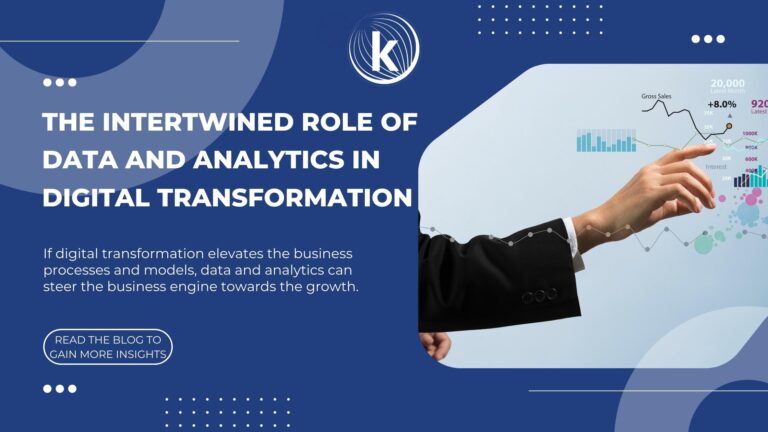As the business landscape evolves at a disruptive rate, the role of data and analytics in digital transformation is assuming prominence. While digital transformation elevates the business model, data and analytics can steer the business engine. If data is the key to insights, analytics helps in empowered decision-making. Put together, data and analytics help innovate product offerings that align with changing consumer preferences, thus boosting business revenue.
In this blog, let us dive deep into the role of data and analytics in digital transformation and how partnering with proven data analytics can elevate your business decision-making.
The role of data and analytics in digital transformation
With disparate data sources, businesses today face the challenges of gathering, filtering, and analyzing data. Amidst the data noise, extracting valuable data can be challenging but not impossible.
Poor data handling can translate into many business challenges, such as data siloes, data quality issues, incompatible processes and outcomes, and the inability to meet customer expectations.
Here is where data and analytics come into the picture to prevent such unforeseen circumstances.
Data strategy is a roadmap to business growth.
A common factor between multiple departments in any organization is data. For instance, a sales team captures one type of data while the marketing team requires another.
In either case, a vital trait of data that flows across the organization is: data is connected.
Chalking a data strategy is not only essential for data handling but also for empowering your teams. It provides intelligible solutions to the critical questions surrounding the accomplishment of business goals.
A defined data strategy is the crux of your digital transformation.
A data strategy isn’t just about data. It is a defined plan that outlines the people, processes, and technology your organization needs to use data to achieve its business goals.
A defined data strategy can support your digital transformation by answering questions such as:
- Are the current processes and workflows aligned with our business goals?
- Are the data sources reliable, of quality, and insightful?
- Are current processes and the workforce adept at handling the data and leveraging it for goal accomplishment?
- Is the current technology across the organization capable of handling and extracting the value from the data?
A comprehensive discussion among all the stakeholders on such data strategy questions forms the first step to business digital transformation.
Data management is a foundational block for digital transformation.
After laying the data strategy, it’s time to move on to data management that yields the expected results from the captured data.
While chalking a data strategy, it is vital to include all relevant teams that handle data at various stages. This provides a 360-degree view of data handling and helps set data handling permissions.
Effective data management must be secure, complete, and targeted toward business goals. Such streamlined data management should also be free from silos and quality issues.
Data-driven organizations are agile and resilient.
Customer preferences and marketplace trends are evolving with the exponential rise in tech-enabled services and products, thus leaving organizations with little scope to ignore staying current with trends and customer preferences.
Data and analytics provide the platform for capturing and monitoring business-relevant data presenting a foresighted picture that benefits business decision-making.
No wonder why Gartner predicts: by the end of 2022, 90% of corporate strategies will explicitly depend on data as a critical enterprise asset and analytics as an essential competency.
Expert data analytics opine that data and analytics have an intense role in corporate strategic planning in carving competent enterprise plans.

Data and Analytics help boost organizational productivity.
Data analysis-driven digital transformation provides end-to-end information over the cloud for employees resulting in seamless collaboration, reduced turnarounds, and delayed time in waiting for data access and approvals.
In other words, data analytics empowers employees and boosts their productivity.
Data and Analytics enhances business reputation and revenue.
Leveraging data and analytics eliminates the painstaking process of software upgrades and unwanted expenditures on outdated software and tools.
Digitally transformed companies are left with more time to focus on team strengthening, attaining new clients, and business expansion. The representatives are left with more time and energy to focus on client engagement and customer satisfaction instead of putting efforts into gathering records and data manually.
All in all, the value of data and analytics in digital transformation is beyond profit-making; it surges business reputation and employee productivity and empowers the business through better decision-making.
Make Kasmo your digital transformation partner!
Digital transformation is not a switch, it’s a process. With business challenges evolving rapidly with the customer and business landscape, your business needs a reliable digital transformation partner who can lead you the right way.
At Kasmo, our team is rich in industry-leading experience in handling digital transformation challenges of businesses of varied verticals. Connect with us to know how we can transform your business the digital way.

